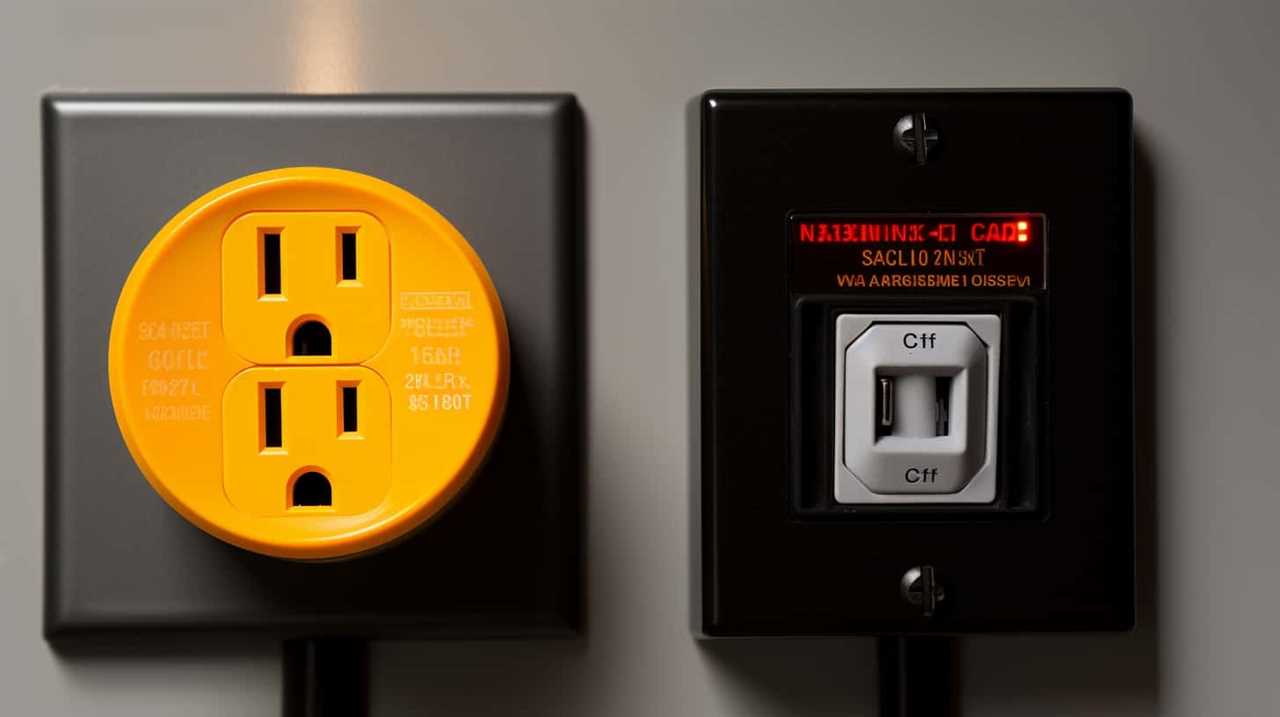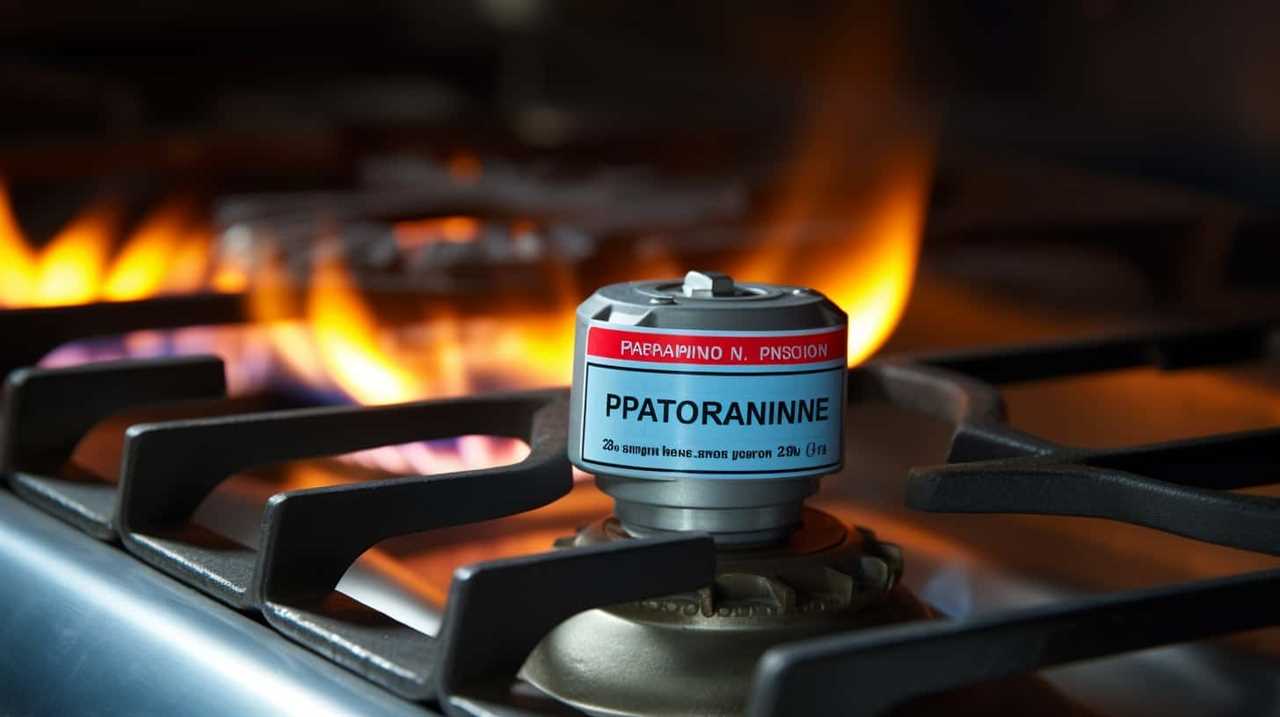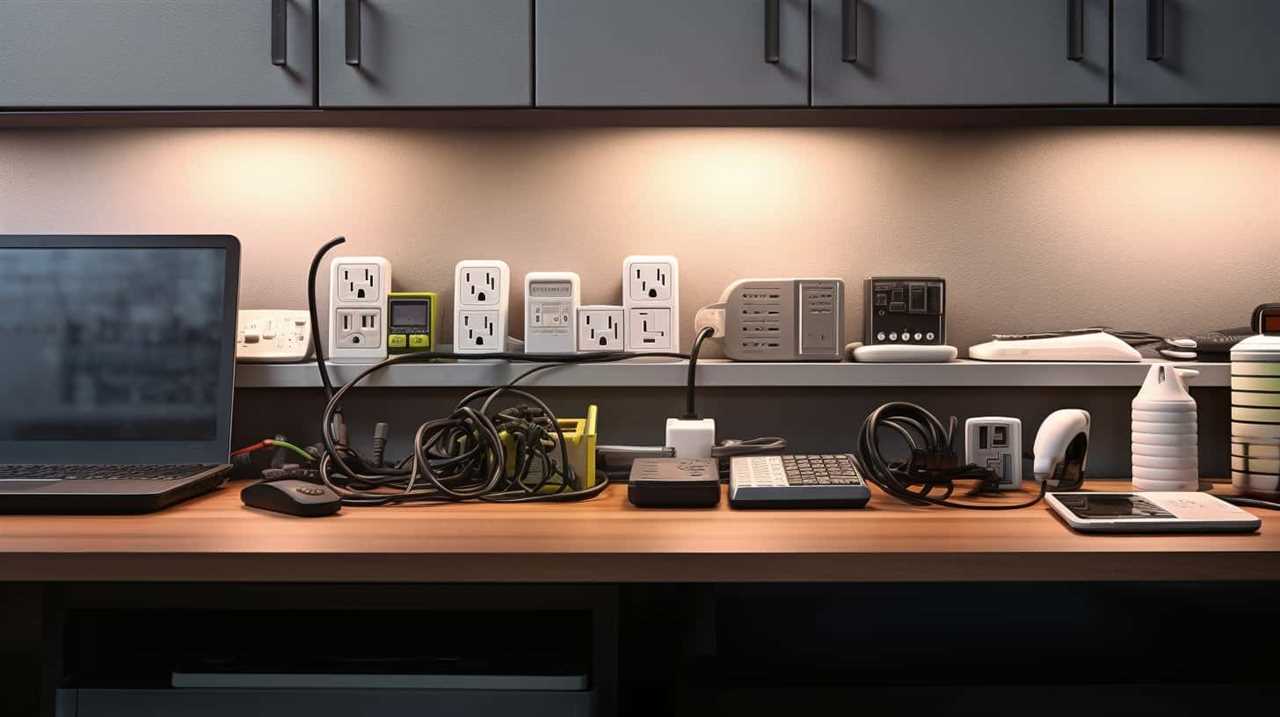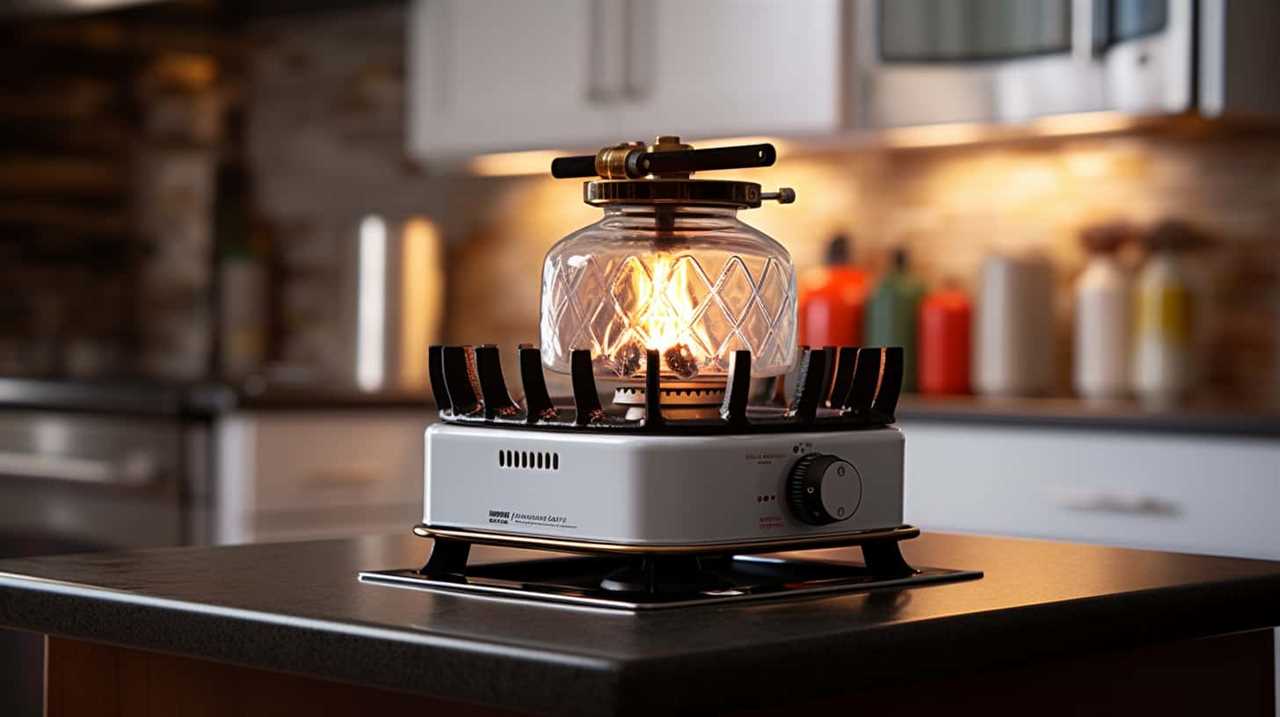A skilled appliance technician focuses on repairing and maintaining household appliances, using diagnostic techniques and tools to efficiently identify and fix common appliance issues.
From refrigerators and dishwashers to washing machines and ovens, appliance technicians are well-versed in a wide range of household appliances. Their expertise extends to repairing techniques and tools, ensuring that appliances are restored to optimal functionality.
To become an appliance technician, individuals must undergo training and obtain certification, demonstrating their competency in the field. This profession offers various job opportunities and growth prospects, along with its own set of challenges and rewards.
As technology continues to advance, appliance technicians will play an integral role in adapting and servicing the appliances of the future.

Key Takeaways
- Appliance Technicians troubleshoot, repair, and maintain various household appliances.
- They undergo specialized training programs and obtain certification to demonstrate competency in appliance repair and maintenance.
- Appliance Technicians can earn a competitive income, with an average annual salary ranging from $40,000 to $60,000.
- They work with a wide range of appliances and need to be familiar with common malfunctions, especially in energy-efficient appliances.
Role of an Appliance Technician
The role of an Appliance Technician involves troubleshooting, repairing, and maintaining various appliances to ensure their optimal functionality. These professionals are responsible for diagnosing issues, performing necessary repairs, and conducting regular maintenance to prevent future problems. Appliance Technicians work with a wide range of appliances, including refrigerators, dishwashers, washing machines, dryers, ovens, and more.
To become an Appliance Technician, individuals typically undergo specialized training programs that cover electrical systems, mechanical components, and appliance troubleshooting techniques. These training programs may vary in length and content, but they generally provide a comprehensive understanding of appliance repair and maintenance.
As for the salary, Appliance Technicians can earn a competitive income, with the average annual salary ranging from $40,000 to $60,000, depending on factors such as experience, location, and employer.
Types of Household Appliances
When it comes to household appliances, there are common malfunctions that homeowners may encounter.

These can include issues with refrigerators not cooling properly, dishwashers not cleaning dishes effectively, or washing machines not draining properly.
Additionally, there are now energy-efficient appliance options available that can help homeowners save on their utility bills while also reducing their environmental impact.
Common Appliance Malfunctions
Appliance malfunctions commonly occur across various types of household appliances throughout their lifespan. Here are four common appliance malfunctions that homeowners may encounter:
- No power: If an appliance is not turning on or not receiving any power, it could be due to a faulty power cord, a tripped circuit breaker, or a blown fuse.
- Leaking: Leaking appliances, such as dishwashers or washing machines, may have issues with the water inlet valve, a worn-out gasket, or a clogged drain hose.
- Overheating: Appliances that overheat, like refrigerators or ovens, may have problems with faulty thermostats, blocked vents, or malfunctioning cooling fans.
- Strange noises: Unusual noises coming from appliances like dryers or air conditioners may indicate worn-out belts, loose parts, or clogged filters.
To avoid these malfunctions, regular preventative maintenance is crucial. By cleaning appliances, checking for loose connections, and following manufacturer’s guidelines, homeowners can prolong the lifespan of their appliances and minimize the need for repairs.

Transitioning into the subsequent section, let’s now explore energy-efficient appliance options.
Energy-Efficient Appliance Options
There are various energy-efficient options available for different types of household appliances. Energy-efficient appliances are designed to use less energy, resulting in reduced utility bills and a smaller environmental footprint.
When it comes to energy efficient appliance installation, the first step is to identify the appliances that consume the most energy in your home. These typically include refrigerators, washing machines, dryers, dishwashers, and air conditioners. Look for appliances with the ENERGY STAR label, as they meet strict energy efficiency guidelines set by the Environmental Protection Agency.
The benefits of energy-efficient appliances go beyond cost savings. They also help reduce greenhouse gas emissions and conserve natural resources. By investing in energy-efficient appliances, you can enjoy long-term savings while contributing to a more sustainable future.

Common Appliance Problems
Common appliance problems can cause frustration and inconvenience in our daily lives.
Some common fridge issues include temperature fluctuations and leaks.
Troubleshooting dishwasher problems often involve dealing with clogged filters or faulty drain pumps.
Additionally, fixing stove malfunctions may require troubleshooting faulty burners or addressing issues with the oven’s heating element.

Understanding these common appliance problems is essential for appliance technicians to provide efficient and effective repairs.
Common Fridge Issues
One of the most prevalent issues faced by appliance technicians is the occurrence of refrigerator malfunctions. Fridge maintenance plays a crucial role in preventing these common problems, particularly issues related to temperature control.
Here are four common fridge issues that technicians often encounter:
- Inadequate cooling: This may be due to a faulty thermostat, clogged condenser coils, or a malfunctioning compressor.
- Excessive frost buildup: This can be caused by a faulty defrost timer, a broken defrost heater, or a defective door seal.
- Water leakage: This may result from a clogged or frozen defrost drain, a damaged water inlet valve, or a blocked condensation line.
- Strange noises: Noisy refrigerators can be caused by a malfunctioning fan motor, a worn-out compressor, or a faulty condenser fan.
Understanding these common fridge issues is essential for appliance technicians to effectively troubleshoot and resolve problems.

Now, let’s transition into the subsequent section about troubleshooting dishwasher problems.
Troubleshooting Dishwasher Problems
An appliance technician specializes in troubleshooting common dishwasher problems and resolving them efficiently.
When it comes to dishwasher maintenance, there are several issues that can arise. One common problem is a dishwasher that doesn’t clean dishes properly. This could be due to a clogged spray arm, a faulty water inlet valve, or a worn-out pump motor.
Another issue that may occur is a dishwasher that doesn’t drain properly. This could be caused by a clogged drain hose or a malfunctioning drain pump.

To address these problems, appliance technicians use various dishwasher repair techniques. They will inspect and clean the spray arm, replace any faulty components such as the water inlet valve or pump motor, and unclog or replace the drain hose or drain pump if necessary.
Fixing Stove Malfunctions
Stove malfunctions are a frequent occurrence that appliance technicians are skilled at resolving efficiently. To ensure optimal performance and longevity of your stove, regular stove maintenance is essential.
Here are some common stove malfunctions and troubleshooting tips to address oven issues:
- Uneven heating: Check if the heating element is working properly and clean any debris or food particles that may be blocking the heat flow. Ensure that the oven racks are placed correctly.
- Oven not heating: Inspect the igniter, thermostat, and power supply to identify the source of the problem. Replace faulty components as necessary.
- Gas leaks: If you smell gas, turn off the stove immediately and contact a professional technician to locate and repair the gas leak.
- Faulty controls: If the stove buttons or knobs are unresponsive, check for loose connections or damaged control panels. Resetting or replacing the controls may be necessary.
Diagnostic Techniques and Tools
The appliance technician’s diagnostic techniques and tools are essential for identifying and resolving issues with household appliances. Through various diagnostic methods and appliance repair techniques, technicians are able to accurately diagnose the problem and provide the appropriate solution.

To effectively diagnose appliance malfunctions, technicians utilize a range of tools and equipment. These tools allow them to measure and test various components of the appliance, ensuring a thorough evaluation. Here is a table highlighting some commonly used diagnostic tools:
| Diagnostic Tools | Description |
|---|---|
| Multimeter | Measures voltage, current, and resistance |
| Infrared Thermometer | Measures temperature without direct contact |
| Circuit Tester | Determines if electrical circuits are functioning properly |
| Pressure Gauge | Measures gas or refrigerant pressure |
Repairing Techniques and Tools
Moving from the previous subtopic of diagnostic techniques and tools, appliance technicians employ a wide range of repairing techniques and tools to effectively resolve issues with household appliances. Here are four common repairing techniques and tools that appliance technicians use:
- Replacement Parts: Appliance technicians often replace faulty components with new ones to restore the proper functioning of the appliance. These replacement parts can include motors, switches, valves, and more.
- Testing Equipment: Technicians use various testing equipment, such as multimeters and voltage testers, to diagnose and troubleshoot appliance problems. These tools help them identify electrical issues and ensure the correct repair approach.
- Repair Manuals: Technicians refer to repair manuals specific to each appliance brand and model. These manuals provide detailed instructions on disassembling, repairing, and reassembling the appliance correctly.
- Welding and Soldering Tools: In cases where appliance components require welding or soldering, technicians utilize tools like soldering irons and welding machines. These tools help them repair damaged or broken parts effectively.
Importance of Safety Practices
To ensure the well-being of both themselves and their clients, appliance technicians prioritize safety practices while performing repairs. Workplace hazards are a common concern in this line of work, which is why technicians adhere to strict safety regulations to mitigate potential risks. These safety practices are crucial for preventing accidents, injuries, and damage to property.
To highlight the importance of safety practices, here is a table showcasing some common workplace hazards and the corresponding safety regulations that appliance technicians follow:

| Workplace Hazard | Safety Regulation |
|---|---|
| Electric shock | Wearing appropriate personal protective equipment (PPE) and following proper electrical safety procedures. |
| Chemical exposure | Using gloves and masks, and working in well-ventilated areas when handling hazardous chemicals. |
| Lifting injuries | Utilizing proper lifting techniques and using lifting aids like dollies or hand trucks. |
| Falls | Using ladders or scaffolding with proper safety measures, such as securing them and maintaining three points of contact. |
| Cuts and burns | Wearing cut-resistant gloves and using appropriate tools for the job to minimize the risk of injury. |
Customer Service Skills
Appliance technicians are equipped with essential customer service skills for effectively interacting with clients. These skills are crucial in ensuring customer satisfaction and establishing a positive reputation for the technician and their company. Here are four important customer service skills that appliance technicians should possess:
- Communication Skills: Effective communication is key to understanding the customer’s needs and explaining the repair process. Technicians should be able to clearly explain technical concepts in a way that the customer can understand.
- Active Listening: Listening attentively to the customer’s concerns and questions demonstrates empathy and helps technicians accurately diagnose the appliance issue.
- Problem-Solving: Appliance technicians should have strong problem-solving skills to quickly identify and resolve issues. They should be able to think critically and find innovative solutions to complex problems.
- Professionalism: Maintaining a professional demeanor, being punctual, and demonstrating respect towards the customer’s property are all important aspects of providing excellent customer service.
Training and Certification Requirements
Appliance technicians must meet specific training and certification requirements in order to establish their expertise and qualifications in the field. These requirements ensure that they have the necessary knowledge and skills to safely and effectively repair and maintain various types of appliances.
Training requirements for appliance technicians typically involve a combination of formal education and hands-on experience. Many vocational schools and community colleges offer programs specifically designed for aspiring appliance technicians. These programs cover topics such as electrical systems, refrigeration, plumbing, and appliance repair techniques. Additionally, technicians often receive on-the-job training from experienced professionals to further enhance their skills.
The certification process for appliance technicians varies depending on the country or region. In the United States, for example, technicians can obtain certification through organizations such as the Professional Service Association or the National Appliance Service Technician Certification (NASTeC) program. These certifications typically involve passing written and practical exams to demonstrate proficiency in appliance repair.

By meeting the training requirements and obtaining certification, appliance technicians can showcase their expertise and provide assurance to customers that they are qualified to handle their appliance repair needs.
| Training Requirements | Certification Process |
|---|---|
| Formal education in appliance repair | Written and practical exams |
| Hands-on experience in appliance repair | Certification through professional organizations |
| Ongoing on-the-job training | Demonstration of proficiency in appliance repair |
Job Opportunities and Growth
The field of appliance repair offers numerous job opportunities and potential for growth. Here are four reasons why pursuing a career as an appliance technician can lead to a promising future:
- Increasing demand: With the constant advancement of technology and the growing number of households, the need for skilled appliance technicians is on the rise. This high demand ensures a steady stream of job prospects.
- Diverse job options: Appliance technicians can find employment in various settings, including repair shops, appliance manufacturers, and retail stores. This versatility allows individuals to explore different work environments and choose a career path that aligns with their interests.
- Salary potential: As experienced technicians gain expertise and specialize in specific appliance types, their earning potential increases. With additional certifications and experience, appliance technicians can command higher salaries and enjoy financial stability.
- Room for growth: The appliance repair industry offers opportunities for career advancement, such as becoming a supervisor, manager, or even starting a business. With the right skills and drive, individuals can climb the ladder and achieve professional growth in this field.
Challenges and Rewards of the Profession
One significant aspect of the profession is balancing the challenges and rewards of being an appliance technician.
Appliance technicians often face a variety of challenges in their work. They must possess a deep understanding of electrical and mechanical systems to diagnose and repair complex appliances. Additionally, they may encounter difficult customers and have to work in tight spaces or uncomfortable conditions.

However, the benefits gained from this profession are numerous. Appliance technicians have the opportunity to work with cutting-edge technology and constantly expand their knowledge and skills. They also enjoy the satisfaction of solving problems and helping customers restore the functionality of their appliances.
In the next section, we will explore the future of appliance technology and how it will impact the work of appliance technicians.
Future of Appliance Technology
As technology continues to advance, appliance technicians will need to adapt to the rapid changes in the field. The future of appliance technology holds exciting possibilities and a significant impact on daily life. Here are four future advancements that will shape the industry:
- Internet of Things (IoT) Integration: Appliances will be interconnected through the internet, allowing users to control and monitor them remotely. This integration will enhance convenience and energy efficiency.
- Artificial Intelligence (AI) and Machine Learning: Appliances will become smarter and more intuitive, learning user preferences and adapting to individual needs. AI will enable appliances to provide personalized recommendations and optimize performance.
- Energy Efficiency Improvements: Future appliances will be designed to consume less energy while maintaining or even improving performance. This will reduce energy costs and have a positive environmental impact.
- Enhanced Connectivity and Data Analytics: Appliances will gather and analyze data to provide insights on usage patterns, maintenance needs, and potential issues. This connectivity will enable proactive troubleshooting and remote diagnostics.
These advancements will revolutionize daily life, making appliances more efficient, user-friendly, and environmentally friendly.

Appliance technicians will play a crucial role in understanding and servicing these advanced technologies, ensuring their seamless integration into our lives.
Frequently Asked Questions
What Are the Salary Expectations for an Appliance Technician?
Salary potential for appliance technicians can vary depending on factors such as experience, location, and industry. However, with the right qualifications and skills, appliance technicians can expect competitive salaries and opportunities for career growth in this field.
Is It Possible to Specialize in Repairing a Specific Type of Appliance?
Specializing in specific appliance brands is possible for an appliance technician. While it is not necessary to have a background in electronics, having knowledge and experience in a particular brand can enhance expertise and job prospects.
What Are the Typical Working Hours for an Appliance Technician?
Appliance technicians typically have flexible schedules that may include evenings and weekends. Their job responsibilities involve diagnosing and repairing various types of appliances, ensuring they are functioning properly and providing exceptional customer service.

Are There Any Physical Requirements for This Profession?
Physical limitations may exist for appliance technicians, as the job may involve heavy lifting, standing for long periods, and working in confined spaces. Necessary skills include mechanical aptitude, problem-solving, and attention to detail.
How Long Does It Usually Take to Complete the Training and Certification Requirements?
The duration of appliance technician training and certification requirements can vary depending on the program and individual progress. However, it typically takes several months to complete the necessary coursework and hands-on training to become certified in this field.
Conclusion
In conclusion, the role of an Appliance Technician involves diagnosing and repairing various types of household appliances using specialized tools and techniques.
With the increasing complexity of appliance technology, it is important for technicians to receive proper training and certification.

Despite the challenges faced in this profession, such as constantly evolving technology and the need for continuous learning, there are ample job opportunities and potential for growth.
The future of appliance technology promises exciting advancements that will continue to shape the field.









